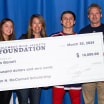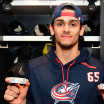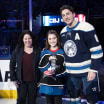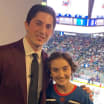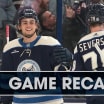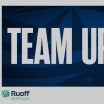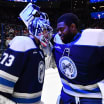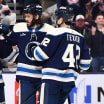They had to change the location of the clinic, just so they could accommodate more kids.
It was a welcomed tweak for a Blue Jackets Community Development team with a mission to break down barriers of entry to the sport of hockey. Through more than 90 free street hockey clinics in the last year, more kids are picking up a stick, many for the first time.
So last week the Blue Jackets descended on the Columbus Global Academy for their most recent clinic, this time with the Ethiopian Tewahedo Social Services after-school program. ETSS is an organization that helps immigrants and refugees from all countries establish roots and gain self-sufficiency in Central Ohio.
Street Jackets Continue to Impact, Inspire Columbus' Youth
Hosted Clinic, Donated Equipment to ETSS
Hosted Clinic, Donated Equipment to ETSS
By
Jeff Carpenter @BlueJacketsNHL / BlueJackets.com
With the cafeteria cleared out and nets set up on each end, 65 kids filled into the room, brimming with anticipation of what the event would hold. Joe Renza, Fan Development Coordinator for the Columbus Blue Jackets, was peppered with questions about the stick he was holding, and when they'd be able to play, before the entirety of the youthful group was settled in their spots.
The appetite to play hockey and learn about the sport within the cafeteria was in full force.
The ETSS students were split into two teams, adorning blue or red pennies, each showcasing a large Blue Jackets logo on the front. Throughout the clinic, the kids enthusiastically cheered for their respective colors, the encouragement of their team ringing throughout the room. It might've not been as loud as the Cannon blasting at Nationwide Arena, but it was close.
Can you blame them?
ETSS was about to be welcomed as the newest Street Jackets center, allowing them to play street hockey when they want, and without any barriers. Street Jackets is the Blue Jackets touch on a league-wide street hockey-inspired initiative that, for the CBJ, began 19 seasons ago with the birth of the franchise.
Street Jackets centers are provided with equipment, curriculum, staff training and more, all at no cost. From there, centers receive guidance from the Blue Jackets Community Development team on how to engage their youth when hockey is the learning vehicle.
Before it gets to that point, however, the Blue Jackets drum up excitement through interactive clinics, where kids learn basic hockey skills while being challenged to listen, think, and work with one another.
That's where Renza, who runs each clinic, comes in.
"From the Blue Jackets side, it's always a special experience to reach a group of children who have little to no experience with hockey," Renza said. "It's our mission to break down barriers of entry to the sport and let the kids know they have the ability to use hockey as an outlet. We get those touchpoints daily, and through seeking opportunities with organizations like ETSS, we are able to showcase our great sport in a way where a child can latch onto a positive first experience and want to pick up a stick again."
The clinic begins with Renza teaching the participants about the sport of hockey, about the hockey stick and its blade, and how to use it properly. The kids are then run through a series of drills, incorporating team-based contests throughout, developing skills such as stick-handling, passing and shooting.
There are Blue Jackets tattoos distributed throughout the clinic to reward listening retention, as kids are encouraged to answer the questions they know. When the clinic is finished, participants receive Blue Jackets swag, such as backpack tags, sweatbands and autograph cards from Stinger, who makes a surprise appearance for a photo and some questions.
Each kid also receives a ticket to a future Blue Jackets game, allowing them to witness live the sport they experienced that day. The high energy of the clinic tends to be maintained throughout.
"I'd say the kids from ETSS were about as energized as I have seen, but more impressive, the kids were able to listen when they needed to and follow instructions," Renza said. "These clinics aren't about who can stickhandle the fastest or shoot the hardest. These clinics are a teaching component of life skills with hockey as the learning vehicle. Kids get the hands-on experience of hockey skills, but we present challenges such as separating into even lines or putting on jerseys the correct way where kids are forced to talk with each other. We try not to interject; we let the kids figure out their own solutions."
Through the sport of hockey, the clinic packs several skills that go beyond what students can achieve with a stick or a pencil in their hands.
"One thing that we really focus on in our outside of school programs is social emotional learning," Jennifer Drury, a Youth Program Coordinator with ETSS said. "The skills they enhanced today, leadership, teamwork, self-management, social awareness, those are all skills that make our students more successful in school as well as help them professional in their future."
Some of those skills were on display when the shooting drill came up, with several kids expressing it as their favorite after the clinic. The group of 65 students scored 75 goals in a five-minute span. Enthusiasm was at a premium, as after shooting, kids wasted no time in hopping back in line to get another chance.
It's that interest in being a part of the program and embracing it, that has shifted the entire dynamic of how the Blue Jackets engage with their community partners.
"I reference going back to when the team started and where we are today," Andee Boiman, Director of Fan Development and Community Programs for the Blue Jackets said. "You can judge that by the community and our partnerships. When the team started, the Blue Jackets were going to centers and exposing kids to the game, because we wanted to build a fan base when the team first came into its infancy. Today, we have the centers reaching out to us and we're trying to schedule as many as we can.
"But what we've noticed is a shift in our business strategy when we work with these partners. So instead of just going and doing a clinic and leaving, now we're creating partnerships, we're seeing kids multiple times a year, getting kids to come to a game, donating equipment, so it's kind of evolved since our almost 20 years of being here."
Last year, the Community Development department saw nearly 5,000 kids through their free street hockey clinics. These clinics have helped springboard kids into a local Street Jackets center so they can continue to work on their hockey skills. There are 49 official Street Jackets centers that are partnered with the Blue Jackets and possess equipment and a playing curriculum they can follow, and last year, the number of kids playing through these centers grew to 2,500. To keep the centers engaged, there's a year-end Blue Jackets-sponsored Street Jackets tournament in March, as well as constant encouragement to get kids to try ice hockey through one of the Blue Jackets-sponsored ice hockey programs.
Along with the large group of kids in attendance, ETSS had almost 20 instructors on hand, standing along the sidelines and reveling in watching the kids smile, laugh and rush to get a stick back in their hands in each drill.
"It's really just been a fantastic experience and opportunity," Drury said. "I think that some of our kids had experienced it over the summer and they're really excited to see it again. They're going to be thrilled to have equipment to play hockey themselves whenever they want. It really makes a group of kids that may not feel very welcome in our community, feel welcome in our community by having a sports team come out."
In a partnership that started last February, the Blue Jackets have reached nearly 300 kids from ETSS via street hockey clinics, hosted a team in the annual Street Jackets Tournament, welcomed 100 members of the organization as fans to a game in March, and even gave 10 lucky kids the chance to meet Blue Jackets defenseman Seth Jones as part the NHL league-wide initiative "Hockey Is For Everyone" in February.
Around 20 of the kids in attendance had been exposed to street hockey when the Blue Jackets made a stop at their summer camp back in July. One of those kids, 11-year-old Spandhan, was brimming thinking about how the day went.
"I liked this one more," Spandhan said. "Especially scoring all the goals."
Spandhan wasn't alone in sharing his excitement among the kids who have stuck with hockey and are inclined to play more.
"It's pretty exciting," Boiman said. "I had the opportunity to chat with some of the kids and they came up excited to share with me everything they knew about hockey. I asked them if they play or is this the first day since the last clinic, and they said 'no we play, after school in my neighborhood.' So it's pretty exciting to know the impact we can have within just a few months with a new partnership, and seeing kids adopt hockey into their everyday lives."
"Each clinic I look for an 'aha moment' from the kids, something that shows me they were able to comprehend a skill or something I was explaining." Renza said. "Today, we had 65 'aha moments.' If I take one thing away from these clinics, it's that."
The premise is based around fun. Hockey is often a sport where if you can get someone into a seat to watch a live game, even with no prior relationship with hockey, they'll become enthralled with the sport, whether latching onto the speed, the skill, the physicality or the crowd's atmosphere. The same can be said for getting a stick in your hands, whether as a child or an adult.
"It was pretty fun, I learned a lot today," 11-year-old Suhely, who has watched hockey before and enjoyed it, said. "My favorite part about today was shooting. How I move the hockey stick and connect on the ball with the blade."
Most of these kids are looking for a sport to play. It's no secret that hockey isn't as accessible as some other premier sports for an adolescent. For basketball, all you need is a ball and a hoop, for soccer, a ball and grass. Street hockey helps close that gap. If you have a ball and a stick, you can have some fun. Judging by how the most recent clinic went, the kids are primed to take advantage of that, from the skills they learned, to the knowledge they acquired, to the fun that they had.
Now, they have their own equipment to play with when they want, however often they'd like.
When asked if he'll be utilizing the gear often, Spandhan excitedly nodded at the opportunity to play hockey more.
Suhely took it one step further.
"I'm really excited so I can train and become better," the 11-year-old exclaimed.
To learn more about Blue Jackets no-cost programming, visit
bluejackets.com/community


